Dec 02, 2024 – Delivery Ceremony of 6.36 Million Bars of Soap to Rohingya Refugee Camp
Hello. Today is the day JTS delivers 6.36 million bars of soap to the Rohingya refugee camp.
Sunim arrived in Dhaka yesterday and spent the night there. After completing his morning practice and meditation, he had breakfast at 5:30 AM with nurungji (scorched rice) brought from Korea. It was the first Korean food he had eaten in 4 days since leaving Korea.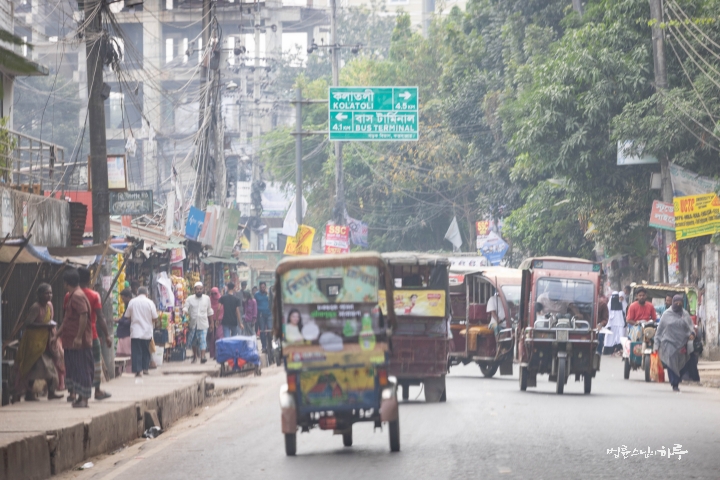
At 6:40 AM, Sunim moved to the airport with the UNHCR Korea representative and his team. After check-in, they departed from Dhaka Airport at 8:10 AM and arrived at Cox’s Bazar Airport at 9:00 AM after a 50-minute flight.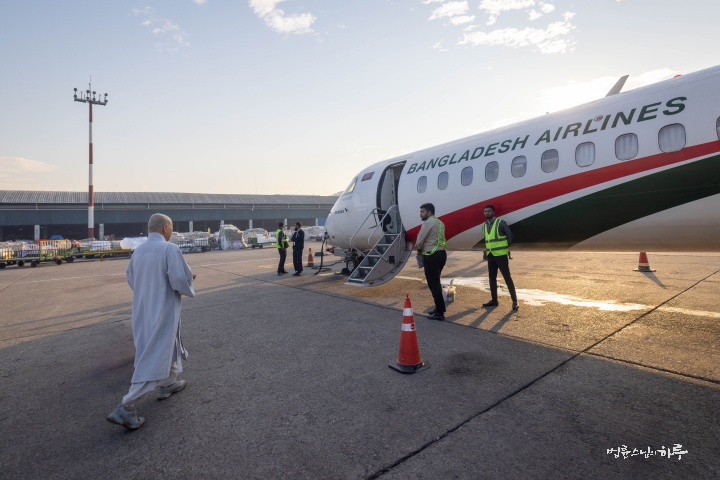
As they got off the plane, Romain Desclous, the UNHCR spokesperson, and staff members warmly welcomed Sunim and the JTS representative.
“Welcome to Cox’s Bazar”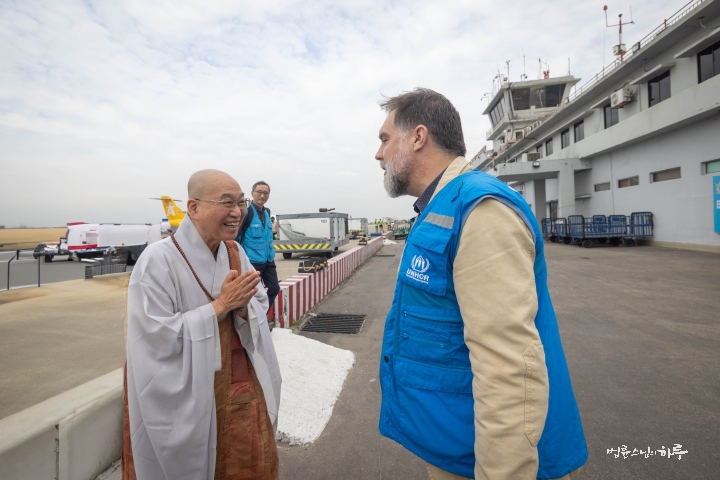
They immediately moved to the UNHCR Cox’s Bazar office.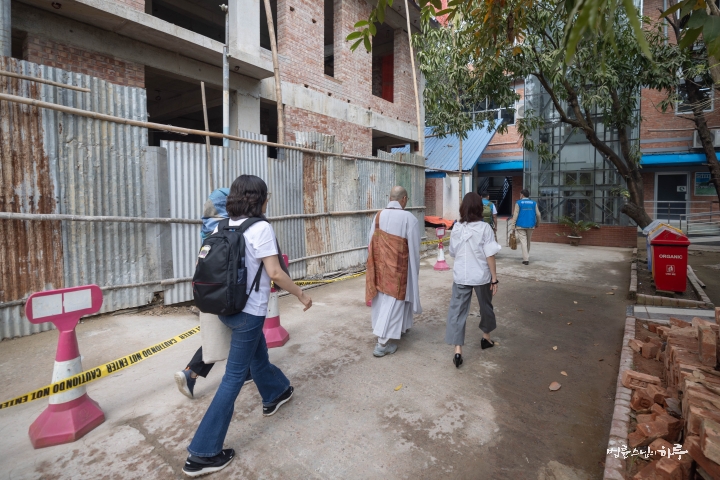
In the cafeteria inside the office, Jing Song, the Senior Operations Coordinator, provided a detailed explanation of the situation in the Rohingya refugee camp.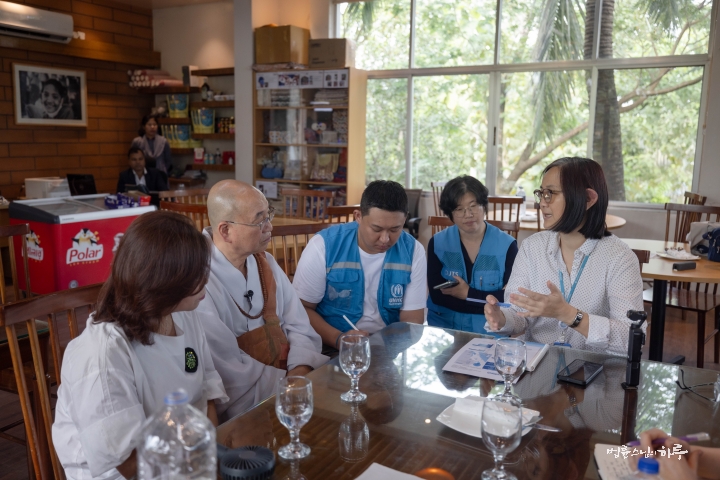
Current Situation in the Rohingya Refugee Camp
“Currently, about 1 million Rohingya refugees are living in Cox’s Bazar. Of these, 97% reside in the Cox’s Bazar camp, while the remaining 3% live on Bhasan Char Island. The main reason for moving to Bhasan Char Island is the safer security environment.
Over the past two years, the security situation in the refugee camp has significantly deteriorated. Conflicts between various criminal organizations within the camp have doubled the crime rate, severely compromising security.
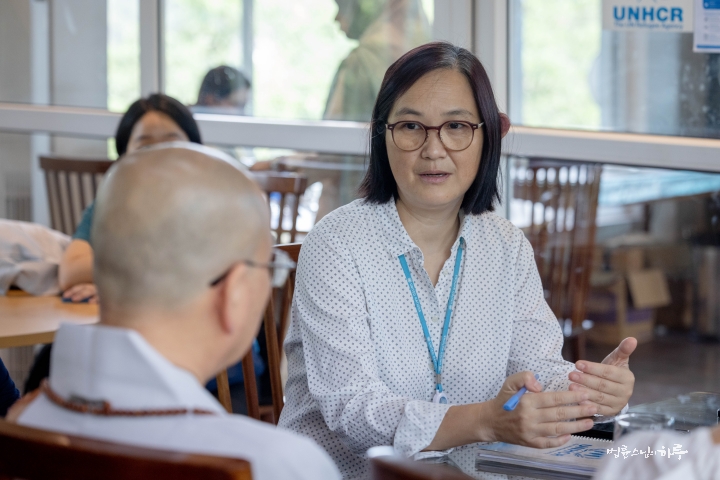
Due to budget cuts by the World Food Programme (WFP), the monthly food support per person decreased from $12 to $8 last year. Although the support amount recovered to $12.5 at the beginning of this year, this reduction had a serious impact on the nutritional status in the camp. For example, the malnutrition rate in 2023 was 15.1%, exceeding the threshold of 15%.
Most of the housing in the camp consists of temporary structures made of bamboo and tarpaulin. The Bangladesh government maintains a policy that all refugees must return to Myanmar, so it does not allow long-term and durable housing improvement measures.”
Sunim asked several questions to gain a deeper understanding of the current situation in the Rohingya refugee camp. Jing Song provided specific data on the current situation and constraints. Sunim first asked about the recent influx of Rohingya refugees.
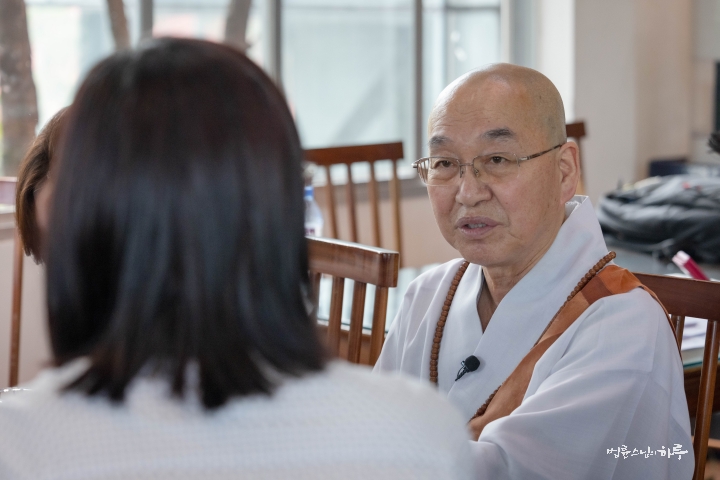
“Are new refugees still coming in? If so, what is the scale?”
“This year, we’re seeing an increasing trend of Rohingya refugees trying to cross the Bangladesh border. While most were blocked by the Bangladesh Border Guard, it’s estimated that about 50,000 have reached the camps. However, it’s difficult to confirm exact numbers due to the lack of government registration approval. Some refugees live with relatives and receive limited support, but those who can’t are in even more precarious living conditions.”
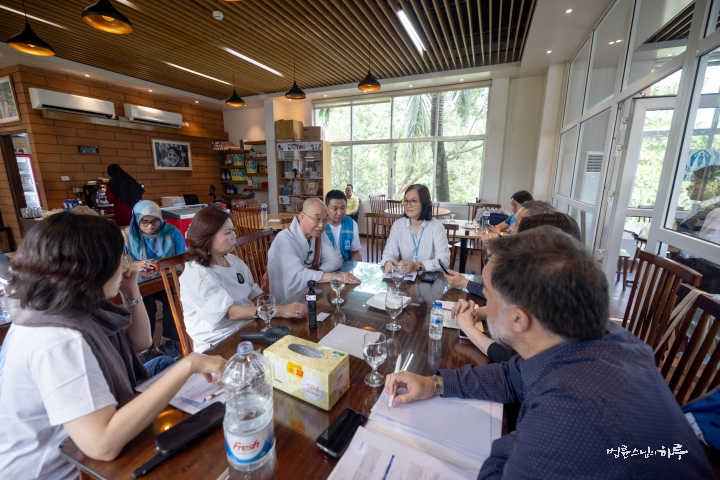
“How many Rohingya people are living in Rakhine State, and what is the likelihood of them coming to Bangladesh?”
“It’s estimated that about 640,000 Rohingya people are living in Rakhine State in Myanmar. However, most of them are reluctant to cross the border. This is because there’s a high risk of losing their land if they come over. Also, since the current conflict in Myanmar doesn’t directly target the Rohingya issue, there hasn’t been a large-scale influx. However, recently, Rohingya people are again being exposed to the risk of violence on the grounds that they support rebel activities.”
After hearing a report that about 30,000 babies are born in the refugee camp every year, Sunim asked, “Are newly married couples or new families recognized as separate households? Do you provide them with living spaces?” Jing Song replied, “While the registration system recognizes new families as separate households, it’s difficult to provide new residences due to the lack of space in the camp. Currently, most families live with more than 10 people in a 10 feet x 15 feet living space,” pointing out the overcrowding problem in the camp.
Sunim noted that the stability of the refugee population and the possibility of additional influx are important factors in solving the problem.
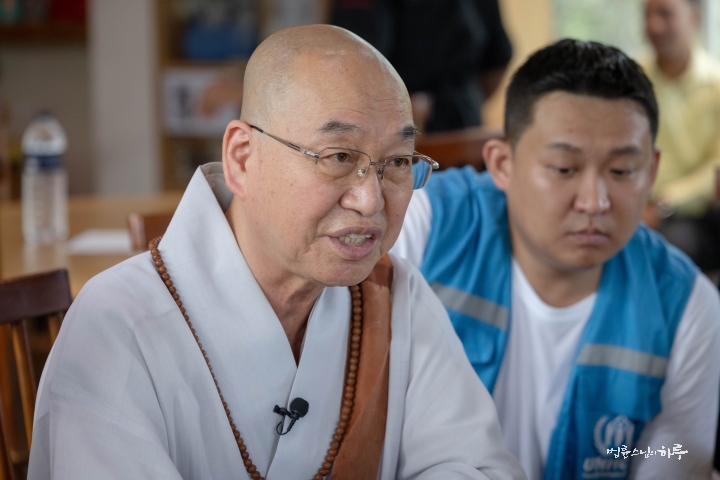
“Whether the current number of Rohingya refugees is stable or continues to increase is very important for future problem-solving. If the number of refugees continues to grow, it will be very difficult to solve the problem. If the influx of new refugees has stopped, we can be more optimistic about the possibility of solving the current refugee problem.”
Jing Song expressed concern about the conflict situation in Myanmar as the biggest variable.
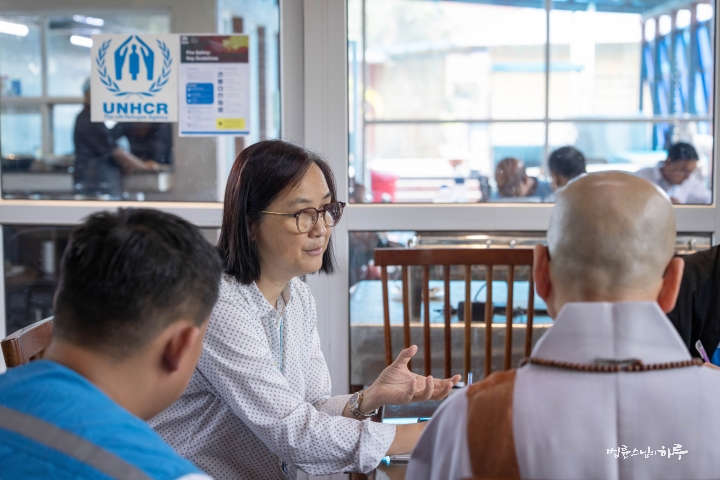
“The current number of refugees can be considered relatively stable. After a large-scale influx of about 750,000 in 2017 and 2018, additional influx has significantly decreased due to the Bangladesh government’s strong border closure policy. However, as the conflict situation in Myanmar is worsening, there’s still potential for influx.”
After finishing the conversation, they moved to the office of Yoko Akasaka, the head of Cox’s Bazar camp operations, for further discussion.
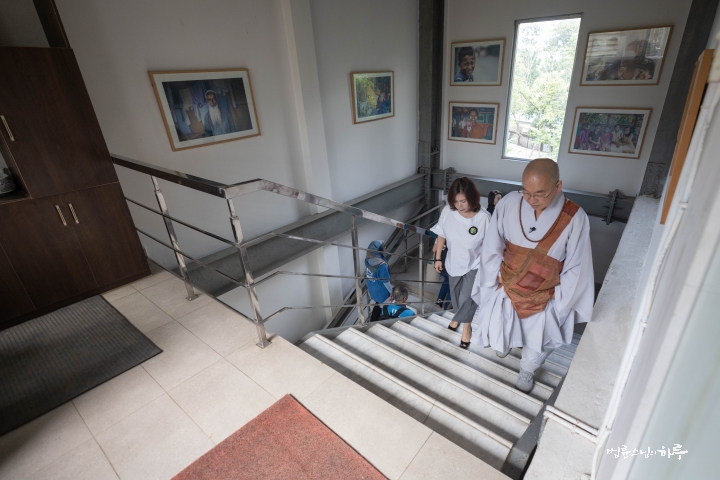
Yoko is in charge of overseeing support activities for Rohingya refugees. First, she showed photos comparing the Rohingya refugee camp before and after JTS provided gas stoves, expressing gratitude to Sunim and JTS.
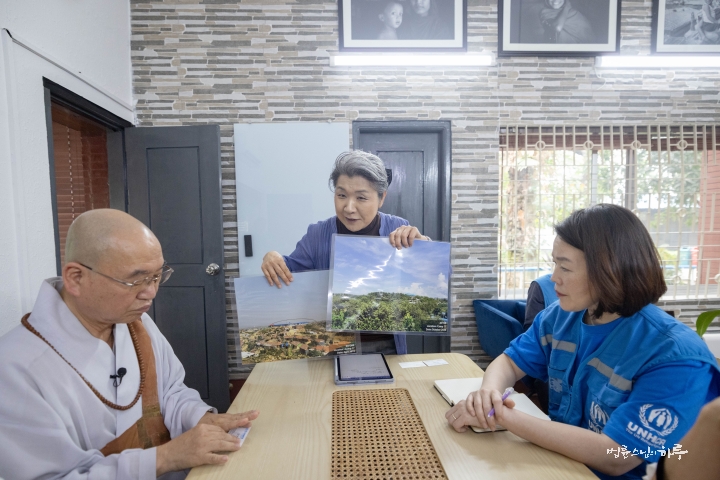
Thanks to JTS, the Devastated Environment Has Turned into a Green Zone
“Thanks to the gas stoves provided by JTS, the refugee camp has turned into a green zone. In the past, refugees burned wood for fuel, devastating the environment around the camp, but since JTS provided gas stoves, they no longer cut down trees. We’re focusing on planting trees and making the camp greener.”
She then explained that they are looking for long-term solutions in various aspects such as environment, education, and self-reliance support, addressing the problems faced by Rohingya refugees.
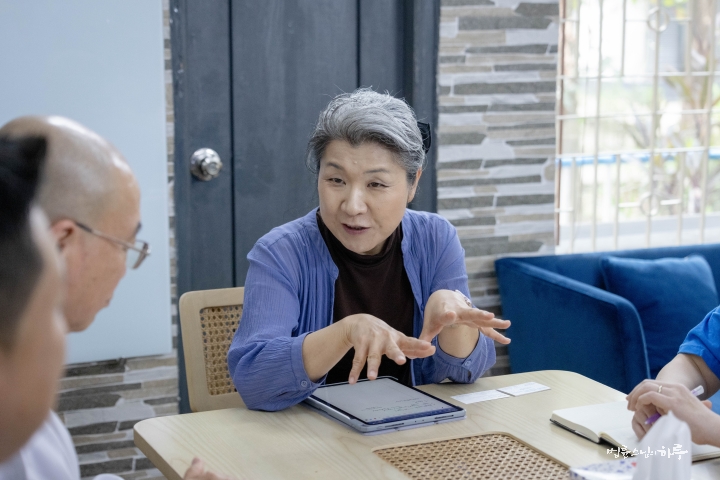
“The Rohingya refugee problem is unlikely to be resolved in the short term. While return to Myanmar would be the best solution, both the international community and the Bangladesh government see little possibility of such return in the short term. Therefore, it’s important to seek long-term solutions so that refugees don’t continuously rely on humanitarian aid. For the past two years, UNHCR has focused on vocational education, skills training, and income-generating activities. We’re considering ways for refugees with occupations such as carpenters and plumbers to work directly and become self-reliant within the camp. Through the COVID-19 experience, we realized that hygiene issues in the camp are serious. Especially in the southern camp, water shortage is severe during the dry season. Solving hygiene and water problems is a very important task for the health and survival of refugees. That’s why the soap provided by JTS this time will be of great help.”
Sunim expressed his pleasure at UNHCR’s efforts to address the difficulties faced by women living in the refugee camp.
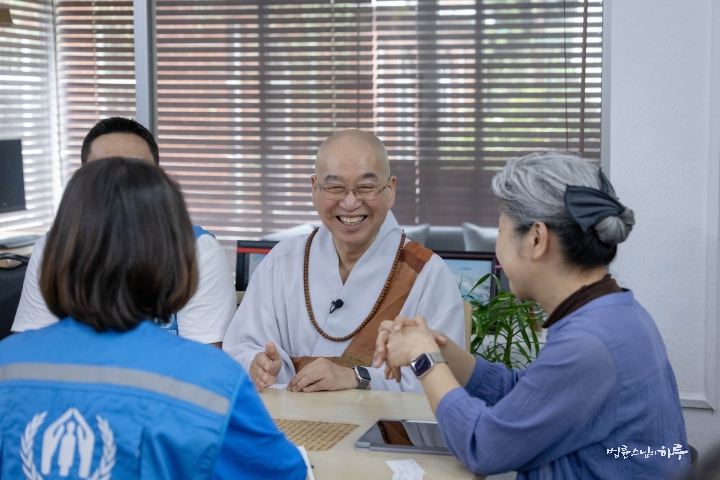
“Newly married couples and especially growing girls had many inconveniences changing clothes and living in small houses with male family members. I’m glad to hear that UNHCR is providing communal bathing facilities for women.”
The director informed that children in the refugee camp have started receiving primary education in the Myanmar language.
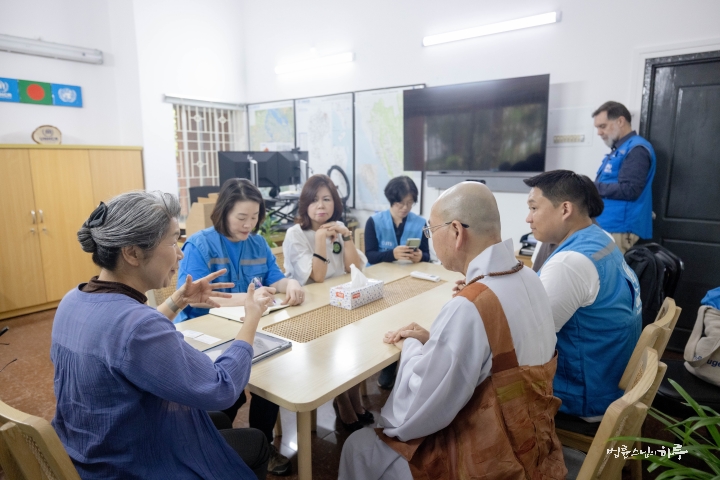
“Children in the camp have started receiving primary education in the Myanmar language, but there’s a problem that they can’t receive certificates. Along with improving the quality of education, we need a system that can officially recognize academic achievements.”
Sunim responded in agreement.
“It’s fortunate that primary education is being conducted even if it’s in the Myanmar language. Of course, the issue of not receiving certificates is important, but for now, the fact that education is taking place itself is the most significant.”
Then, Sunim asked about the refugee relocation to Bhasan Char Island, “When it was announced that a refugee camp would be set up on the island, there were many concerns due to its isolated conditions. What’s the current situation?” Yoko replied, “The island has limited mobility in an isolated environment, and the residences are not suitable for family living. Currently, about 36,000 out of the planned 100,000 are residing there, but additional relocation plans are still undecided.”
Finally, Sunim expressed his gratitude to the director and UNHCR staff.
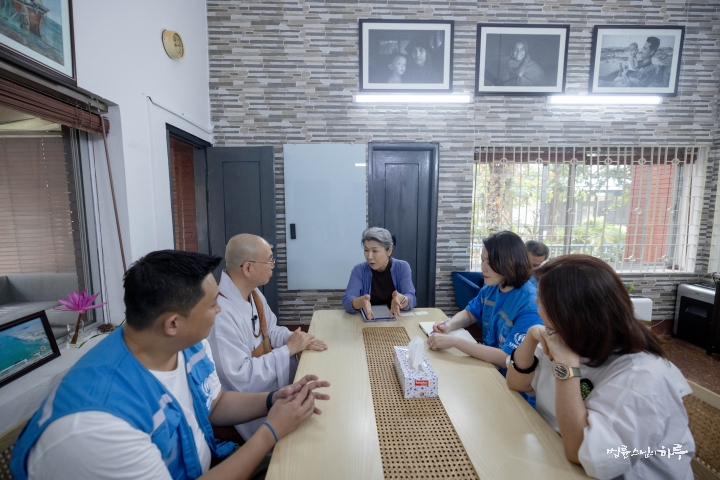
“I’m glad to hear that JTS’s gas stove support has contributed to making the refugee camp green. Thank you for UNHCR’s efforts to protect the environment and improve the quality of life for refugees.”
After taking a commemorative photo outside the office, they moved to the location of the Rohingya refugee camp.
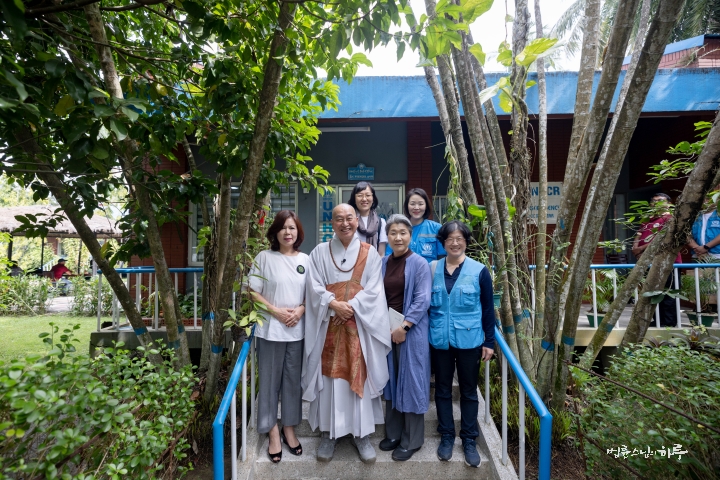
May This Soap Help Improve the Difficult Conditions
After driving for 1 hour and 20 minutes, they arrived at Camp 4 area within the Rohingya refugee camp at 1 PM.
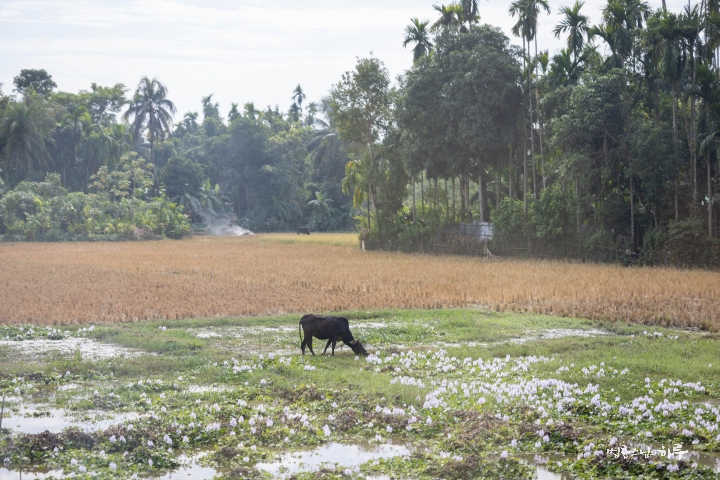
The manager of Camp 4 area expressed their gratitude to Sunim.
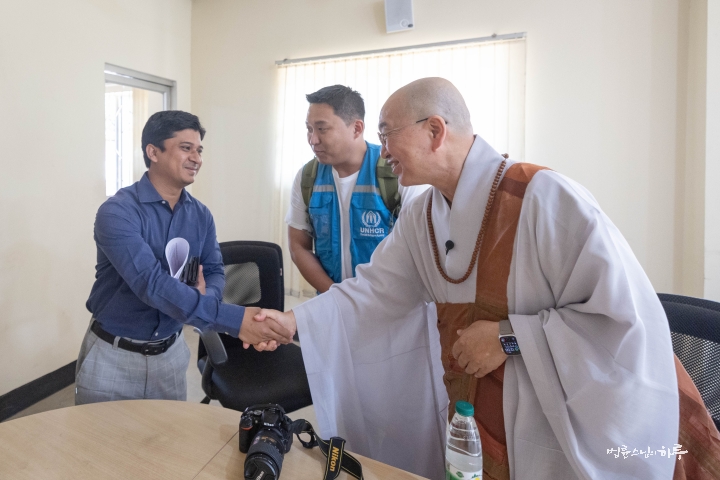
“We are grateful for JTS’s continuous support. The soap you’ve provided this time will be distributed to all refugees living in 16 camps under UNHCR’s jurisdiction. Thank you very much.”
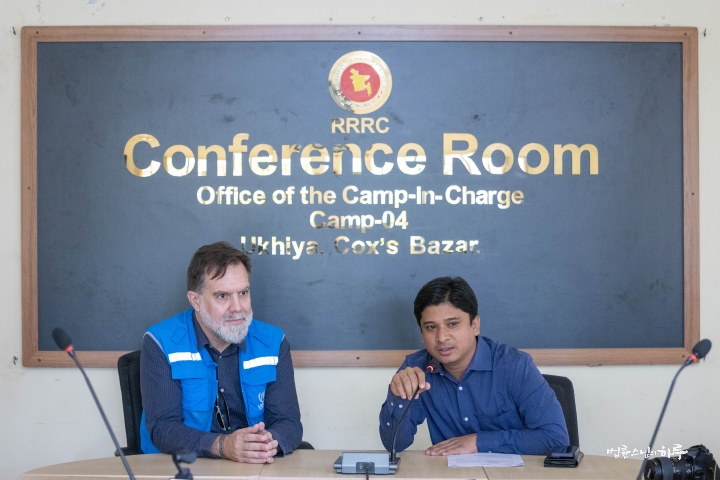
Sunim also spoke on behalf of JTS supporters.
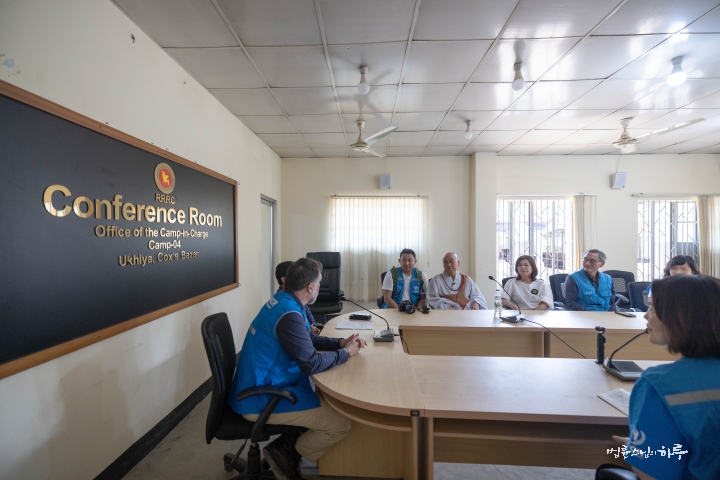
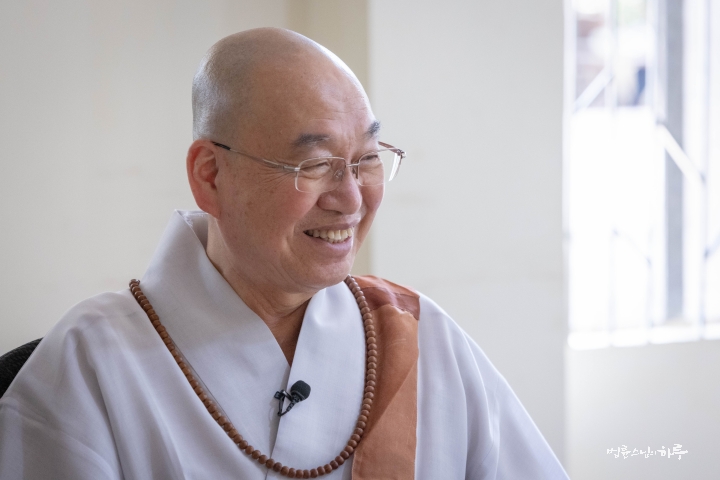
“I hope this soap will help improve the difficult conditions in the refugee camp.”
After greeting the person in charge of Camp 4, they headed to the warehouse where the soap is stored.
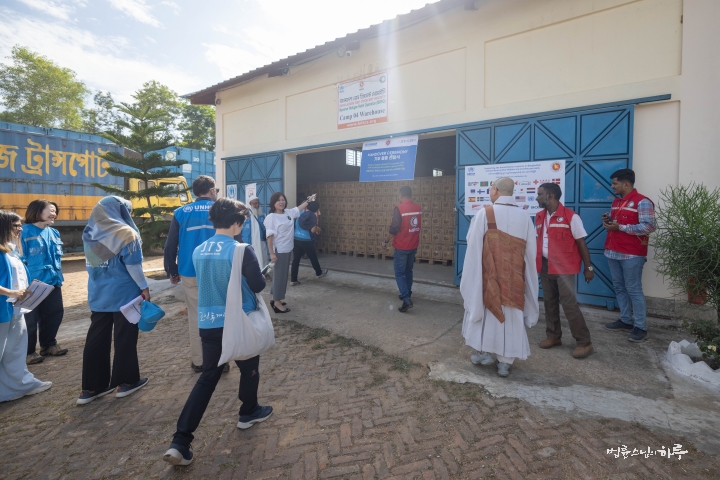
In the warehouse, 2 million bars of soap had arrived for distribution to refugees: 1 million bars of laundry soap and 1 million bars of face soap. They have decided to support Rohingya refugee camps with soap donations. The plan is to provide a total of 6.36 million bars of soap over three separate occasions. Each donation will consist of 2.12 million bars of soap, and these will be distributed this June, next December, and next June. The soap will be distributed to 450,000 people living in 16 camps under UNHCR’s jurisdiction, with each person receiving one bar per month for 1 year and 6 months.
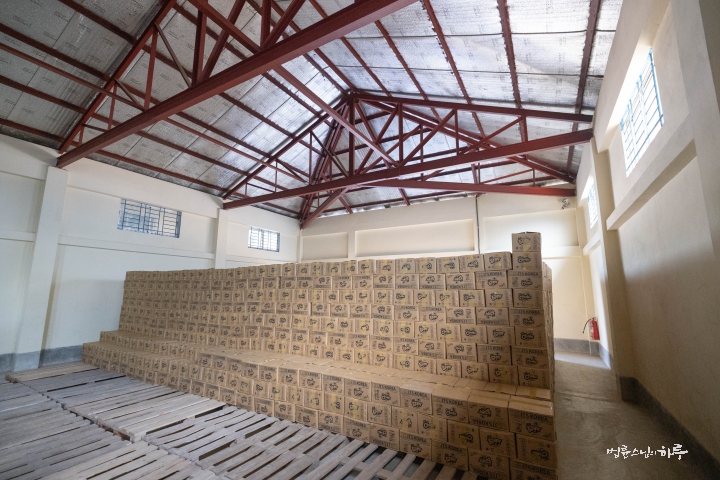
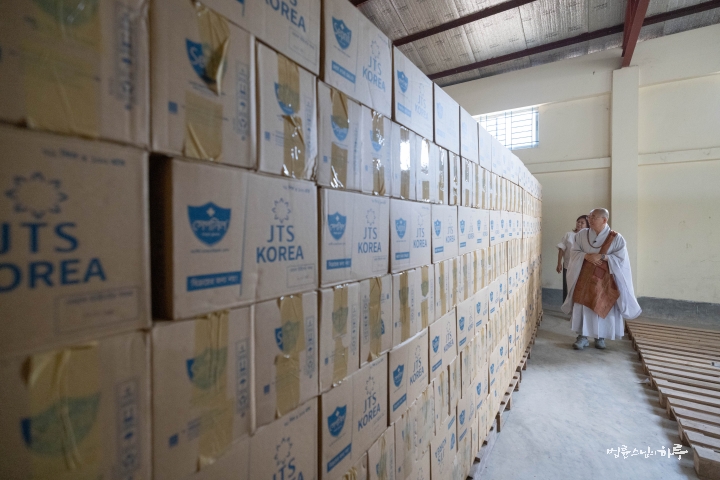
On April 5th, the UNHCR Deputy High Commissioner visited the JTS Korea office and requested soap support from Sunim. He explained that due to the war between Ukraine and Russia, the international community’s attention has shifted to Ukraine and the Middle East, resulting in a significant budget cut for the Rohingya refugee camp. As a result, it became difficult to provide even basic hygiene products to refugees. After that, the JTS representative made several business trips to Bangladesh for market research and supplier search, and finally signed a soap production contract last October, leading to today’s soap delivery ceremony.
First, a UNHCR staff member explained the distribution and management system for the soap.
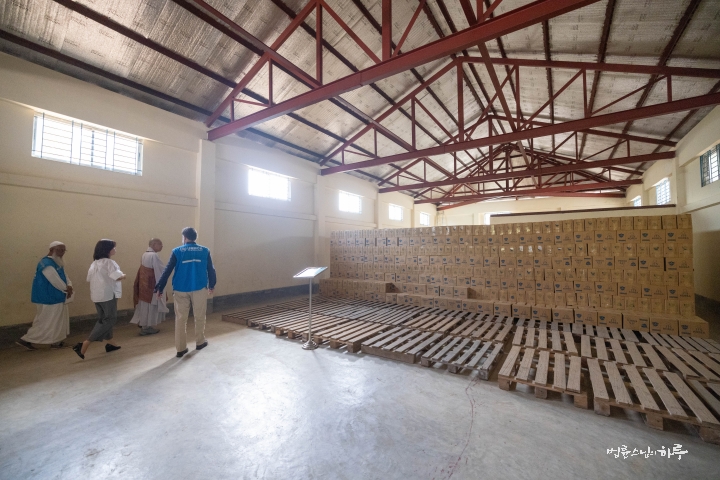
“We have started distributing the soap provided by JTS to refugees from today. For registered refugees, we manage the distribution process meticulously through a global distribution tool based on biometric information and personal data. This system updates new-born children or newly influxed refugees monthly, ensuring accurate data. In a situation where humanitarian support is decreasing, the sponsorship of JTS and Venerable Pomnyun Sunim has not only provided material support but also given a big resonance to remind the international community not to forget the Rohingya refugee issue.”
After listening to the explanation, they held a soap delivery ceremony together. UNHCR spokesperson Romain expressed gratitude to JTS supporters.
“This soap is not just a hygiene item. It provides the minimum conditions for a dignified human life. Thanks to JTS.”
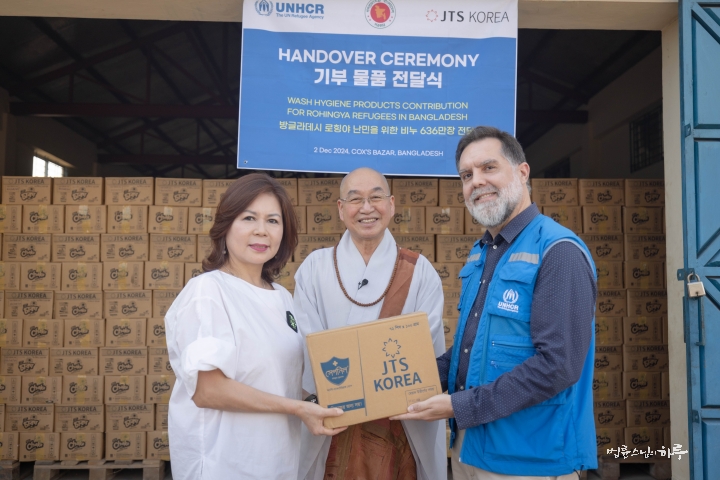
After taking commemorative photos, they moved to the distribution site to deliver soap directly to the refugees.
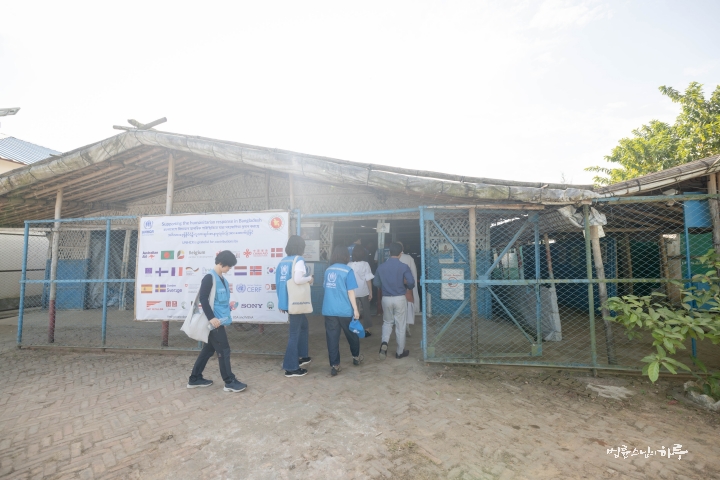
They said that during the production process at the factory, JTS KOREA logos were attached to each individual soap bar.
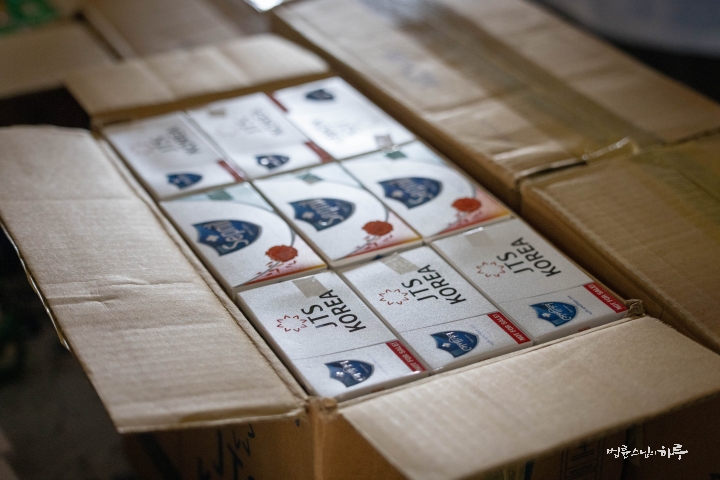
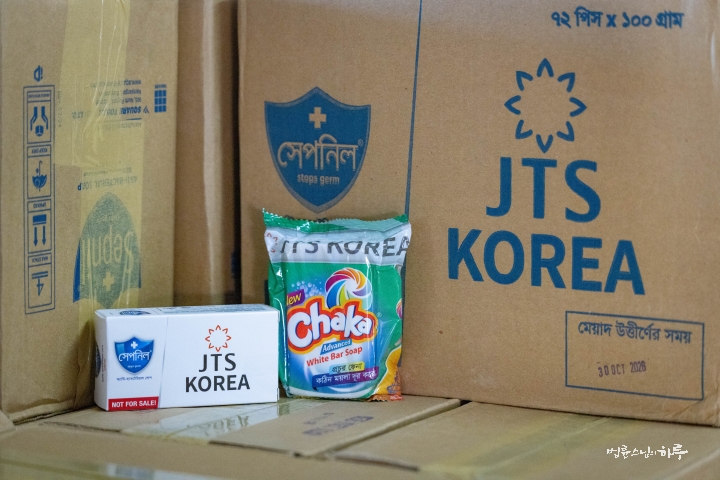
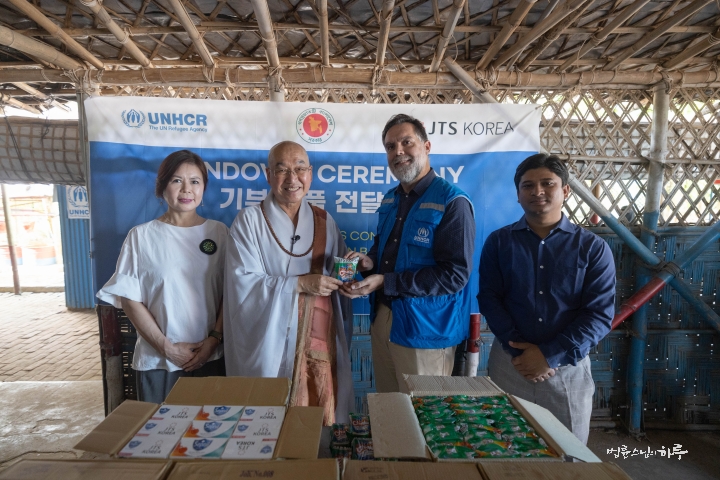
One bar of face soap and one bar of laundry soap were distributed per person, calculated according to family size. Antibacterial soap was prepared as many refugees complained of skin diseases. Women were also given hygiene kits.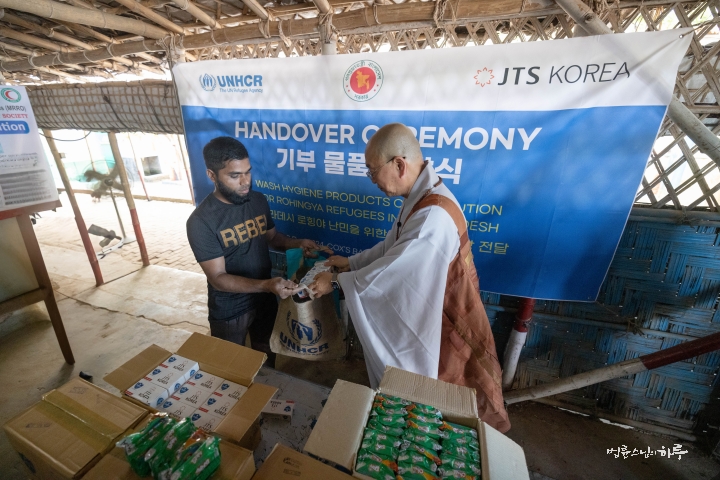
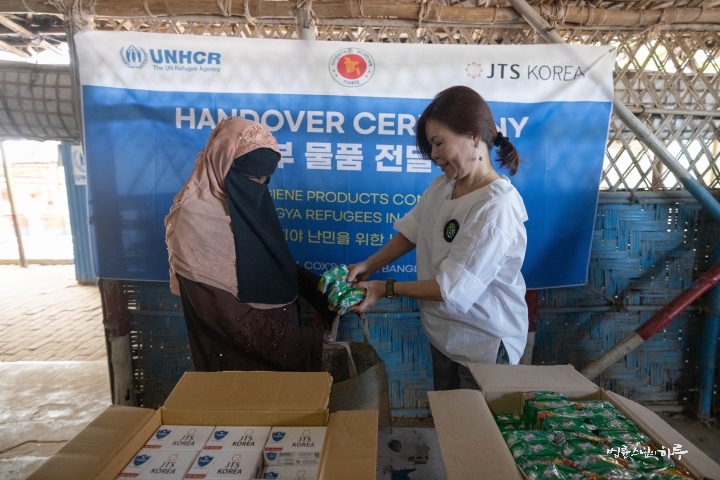
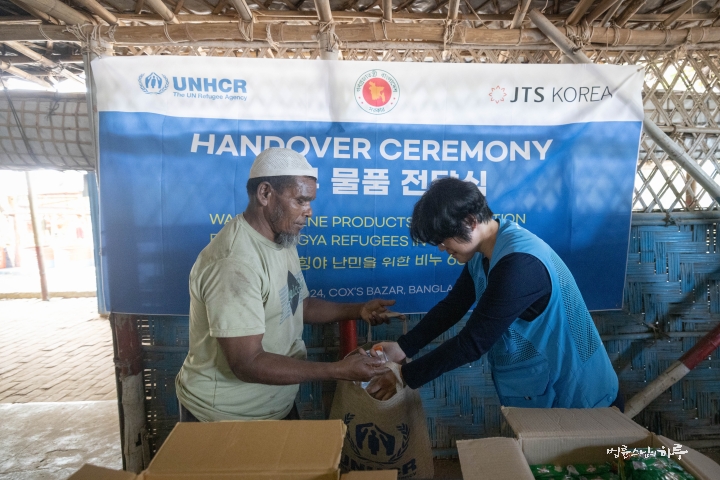
“Thank you.”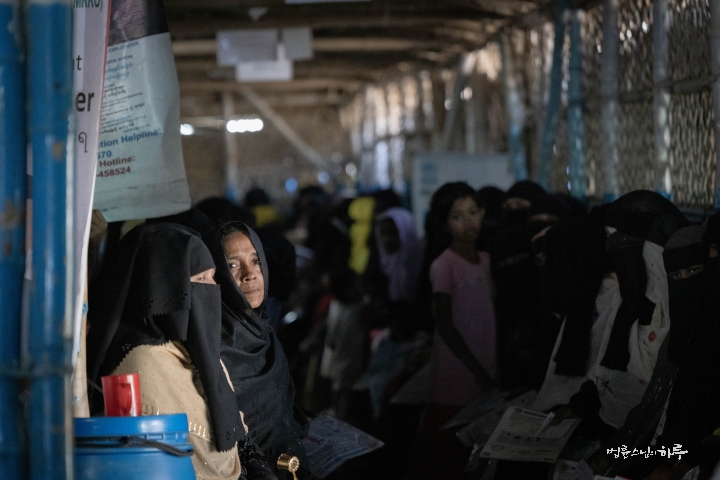
After distributing soap to the refugees, a container storing gas stoves that JTS had previously provided was visible. Some remaining gas stoves were shown.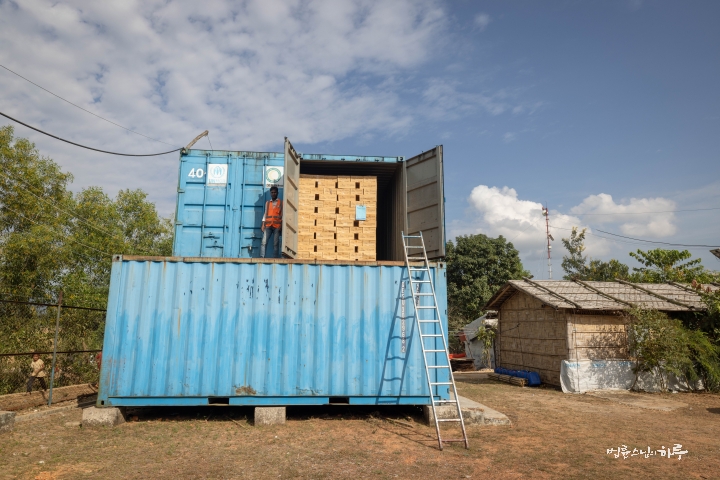
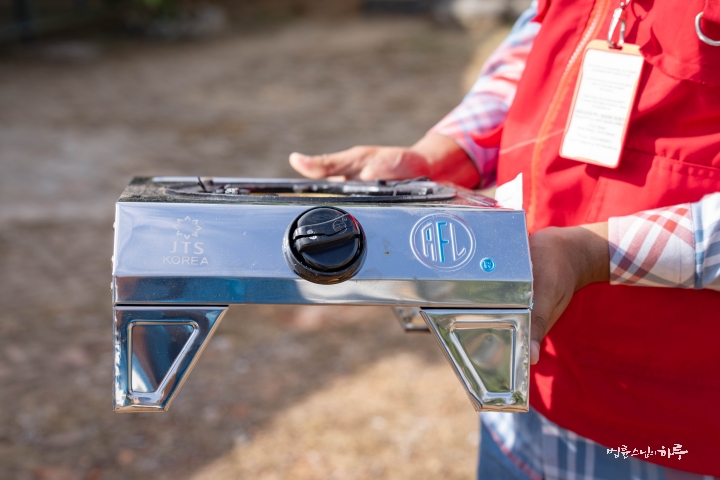
Sunim got back in the car to make home visits. He decided to visit one household to see how refugees were actually using the gas stoves.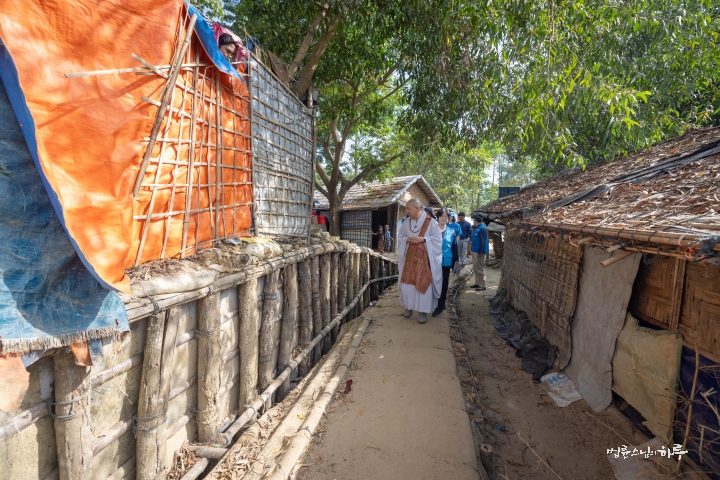
I’m So Happy to Have a Gas Stove
Following the guidance of a UNHCR staff member, Sunim entered a house and went to the kitchen. A woman turned on the gas stove, and the flame ignited immediately.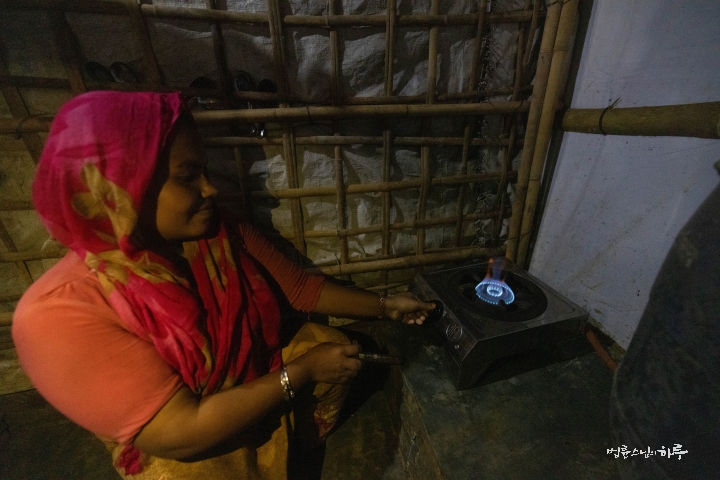
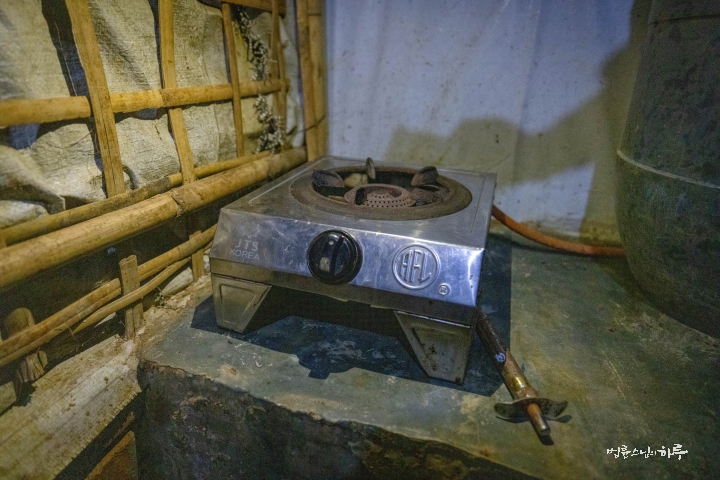
Sunim asked the woman a question.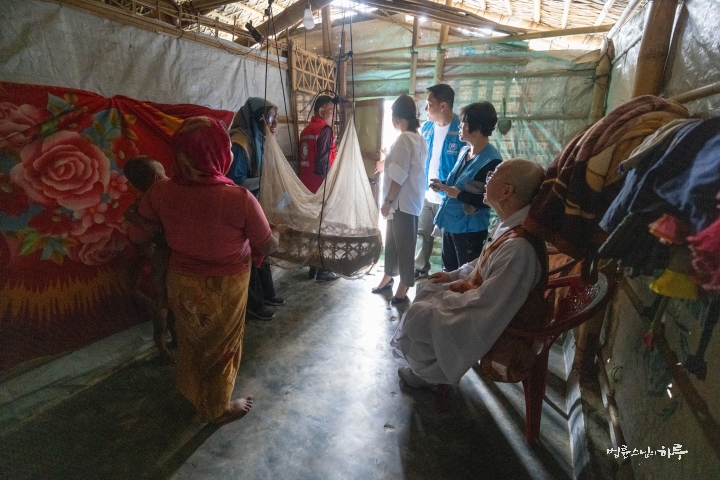
“How do you find using the gas stove?”
The woman smiled and replied.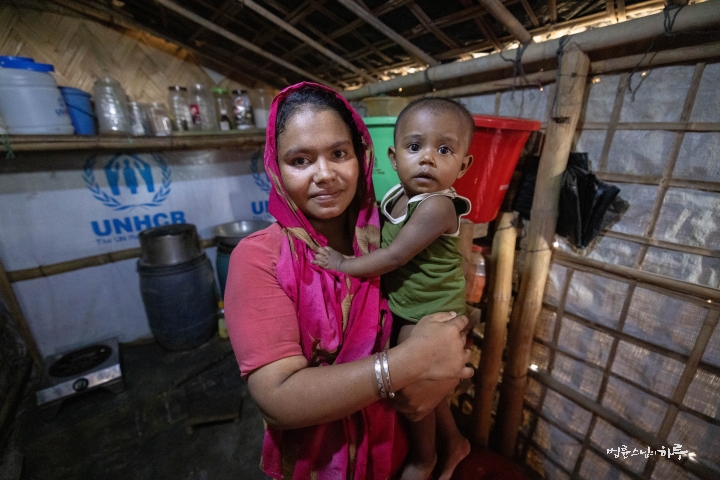
“Cooking has become very convenient. I’m so happy to have a gas stove.”
Sunim asked a few more questions.
“Do you do laundry at home or in a communal facility?”
“We do it in a communal facility.”
“What about showering?”
“We use communal facilities.”
Fortunately, UNHCR has installed large water tanks in various locations. Refugees go to communal facilities near the water tanks to do laundry, take showers, and fetch water for cooking.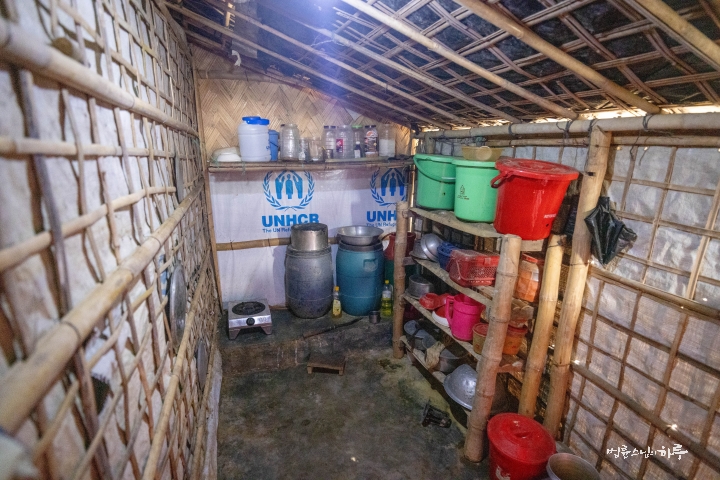
Park Gena, the JTS representative, also asked a question.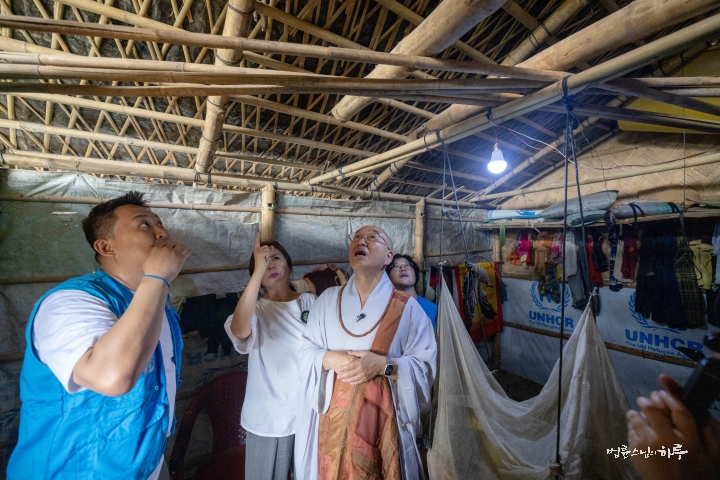
“There are times when it rains heavily. Does the roof leak?”
“It leaks a little.”
As they left the house, children gathered around.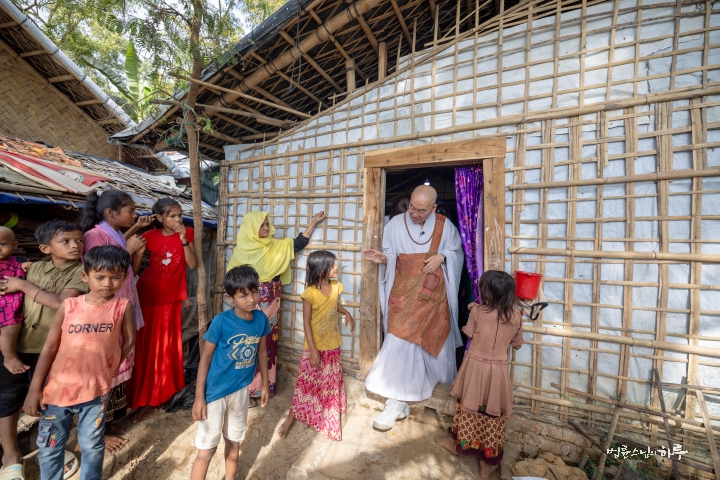
After greeting the children, they left the village. This camp had sewers in all the narrow alleys, which helped reduce odors.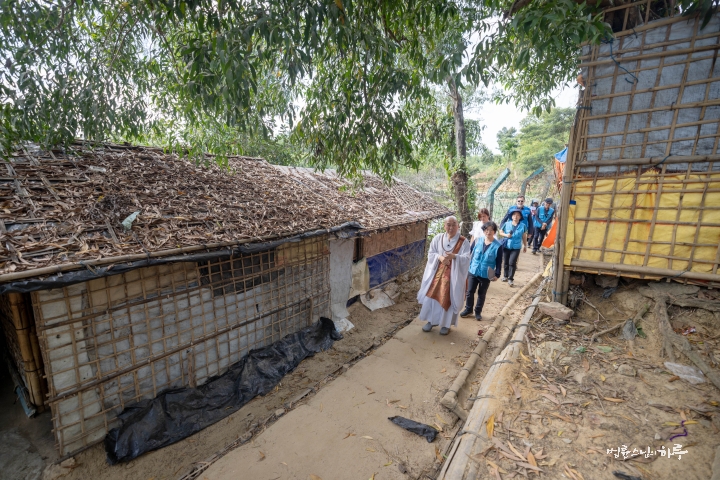
“It may look poor, but it seems relatively well-organized compared to other refugee camps. They’ve even paved the roads.”
After the home visit, UNHCR staff wanted to show Sunim the warehouse where they distribute LPG gas.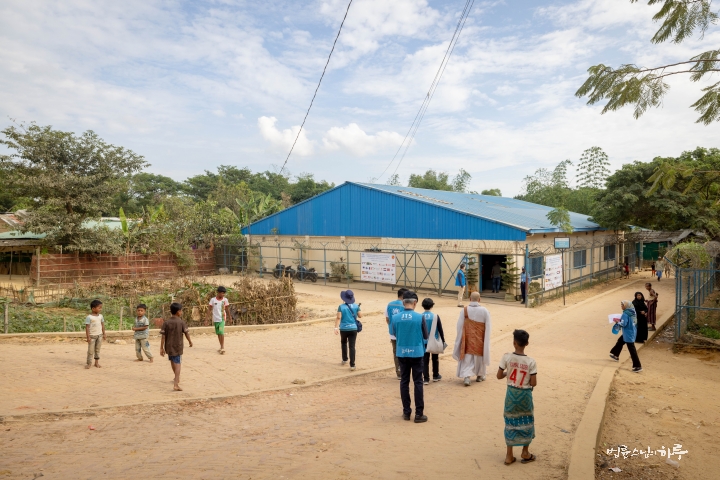
They explained in detail how they distribute the gas.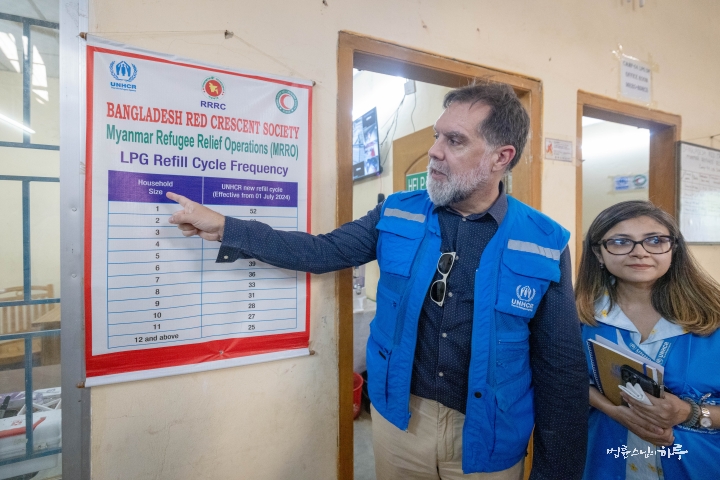
“The frequency of LPG gas refills is determined by family size. For families of 1-2 people, we refill every 52 days, while for families of 6, we refill every 39 days. We provide enough for each household’s needs while ensuring it’s not distributed too frequently. Families must bring empty containers for refills. We’ve introduced pressure cookers to reduce cooking time. Using pressure cookers allows for less gas consumption while shortening cooking time.”
Romaine proudly pointed to the building’s pillars and ceiling.
“While all buildings in the refugee camp are made of bamboo, you can see that this building is not. After numerous negotiations with the Bangladesh government, we were able to construct this building to ensure the safety of the LPG gas storage area. It’s equipped with fans, emergency exits, fire extinguishers, and other safety facilities. It took a great deal of effort to make this happen. All of this is thanks to JTS, who provided the gas stoves.”
Everyone applauded and shared in the joy. Sunim was curious about how they handle gas stove repairs. In response, they demonstrated the repair process while explaining.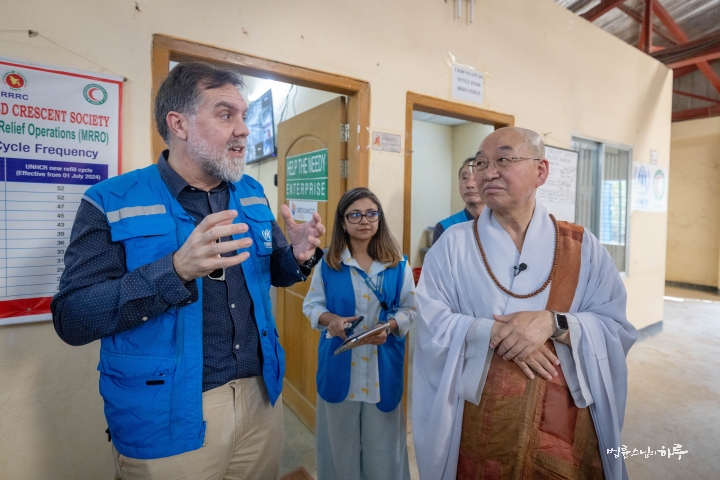
“We run a training program for skilled refugees to handle gas stove repairs. Currently, about 17 volunteers in the camp participate in repair work. This provides refugees with opportunities for self-reliance and ensures immediate stove repairs.”
At the repair site, Sunim asked the volunteer a few questions.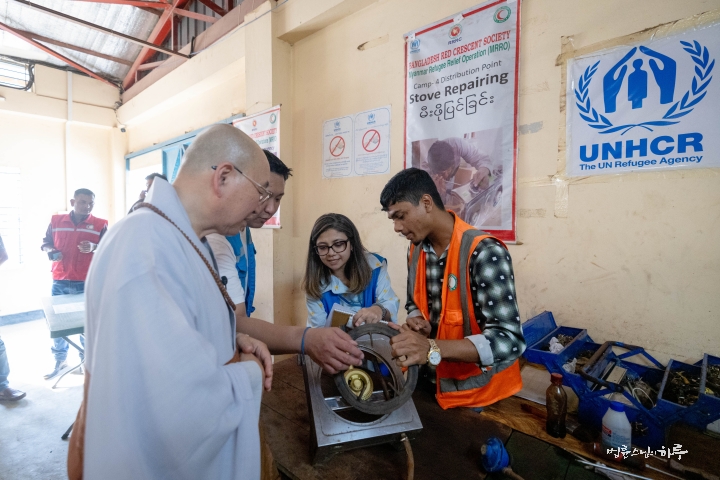
“Which parts of the gas stoves tend to break down most often? And how long can a repaired stove be used?”
“The main problem areas are the knobs and ignition systems. Knobs are prone to corrosion due to heat exposure, and ignition systems can get clogged with dust over time. We clean or replace these parts to solve the issues. With proper maintenance, the stoves can last for 2 to 2.5 years.”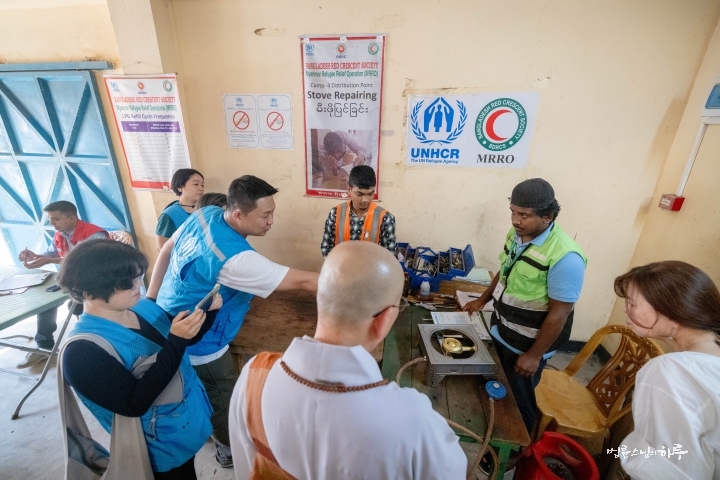
It became clear that gas stove repair is not just about maintaining equipment, but also an important activity that leads to refugee self-reliance and skill development.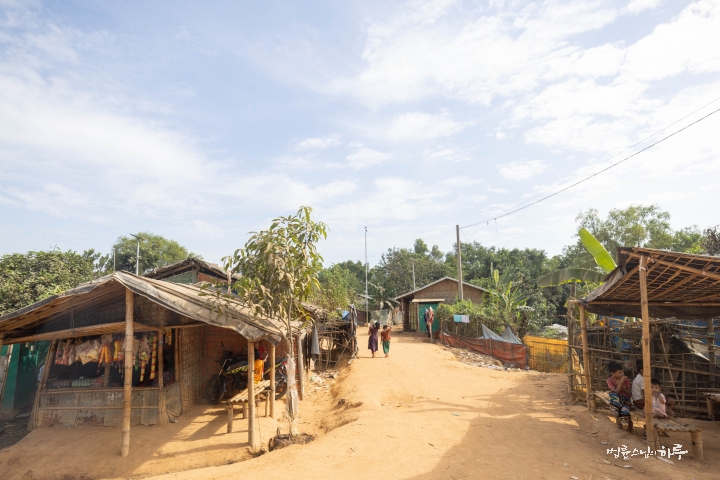
After visiting the refugee camp, they departed for Cox’s Bazar at 3 PM. On the way, they stopped at a cafe for a late lunch of sandwiches.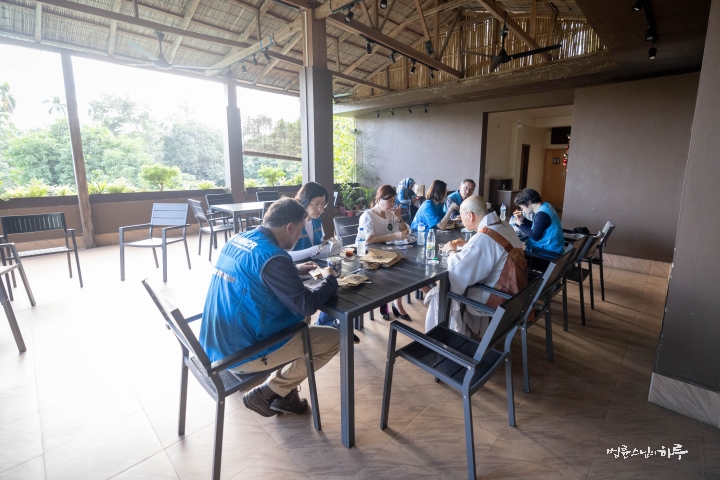
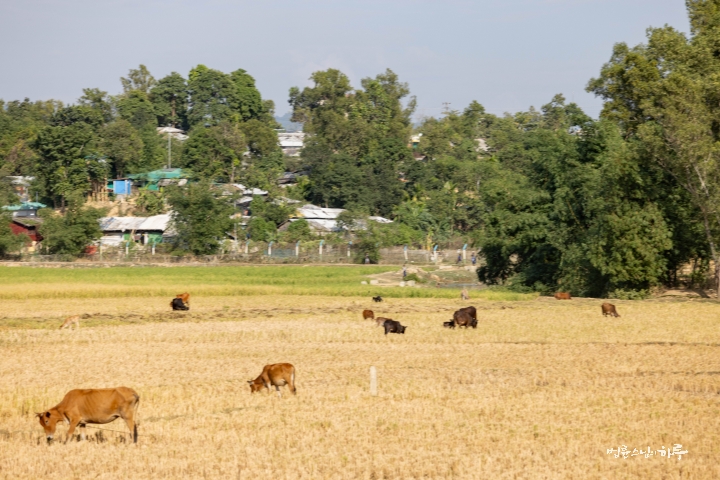
At 4 PM, they entered Cox’s Bazar city. With some time left before the flight, they visited the UNHCR office to talk more with the staff. After taking commemorative photos, they left the office and headed to the airport.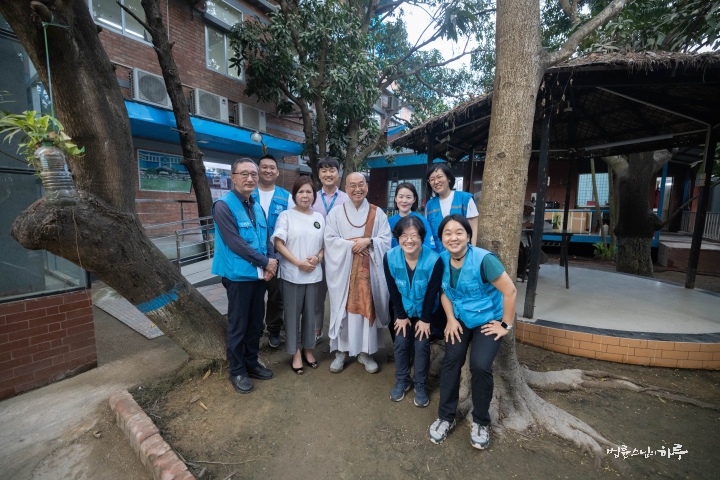
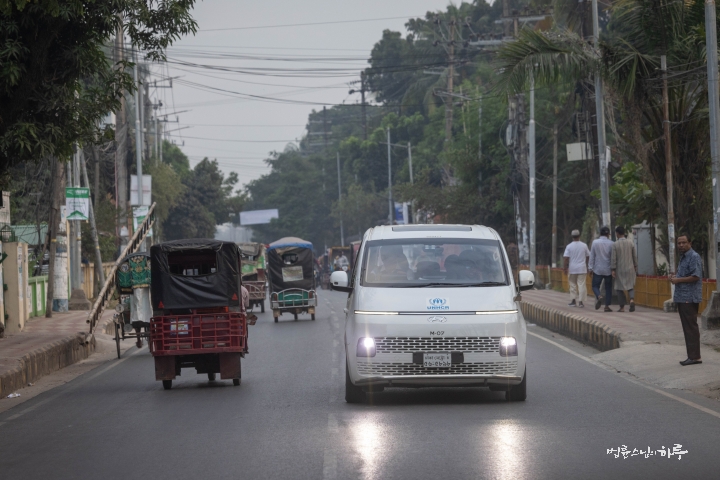
As the sun set, the plane departed from Cox’s Bazar airport at 6 PM and arrived at Dhaka airport at 7 PM after a one-hour flight.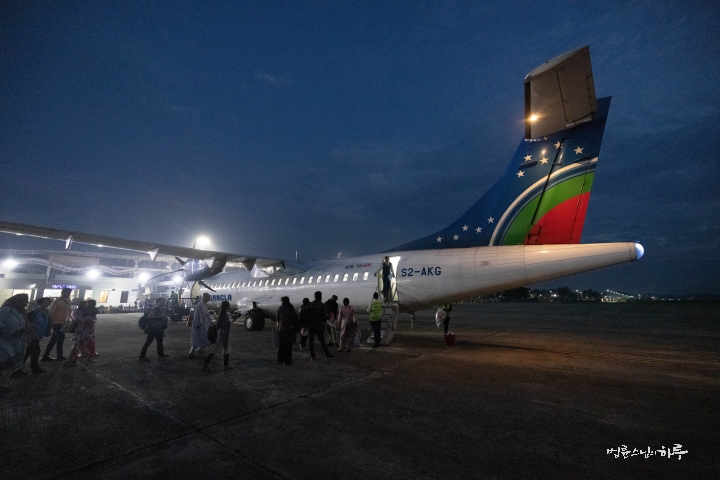
Upon arrival at the airport, they checked in their luggage, completed departure procedures, and moved to the boarding gate to wait. While waiting for the boarding time, Sunim rested on a chair in a corner of the airport.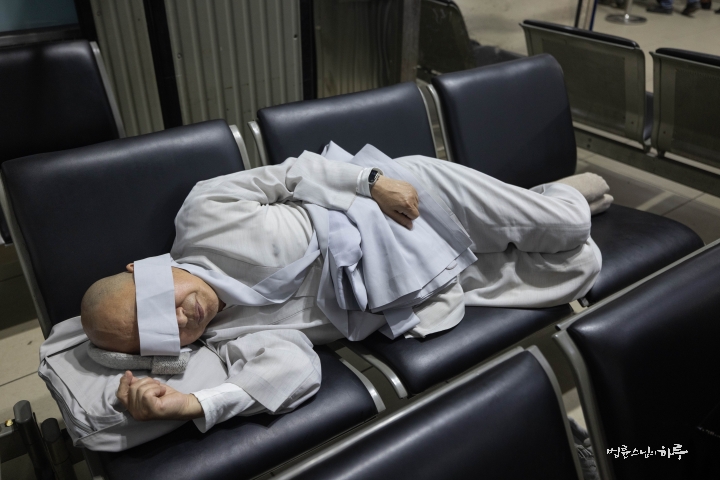
The plane that departed from Dhaka airport at 11 PM headed for Guangzhou airport in China.
Tomorrow, they will return to Korea after a 5-night, 6-day overseas trip. After a short nap on the plane overnight, they will transit through Guangzhou, China, and are expected to arrive at Incheon Airport in the afternoon.





I am humbled by what Sunim and JTS does for the people who are now almost invisible and not heard to the outside world. Thank you. 🙏